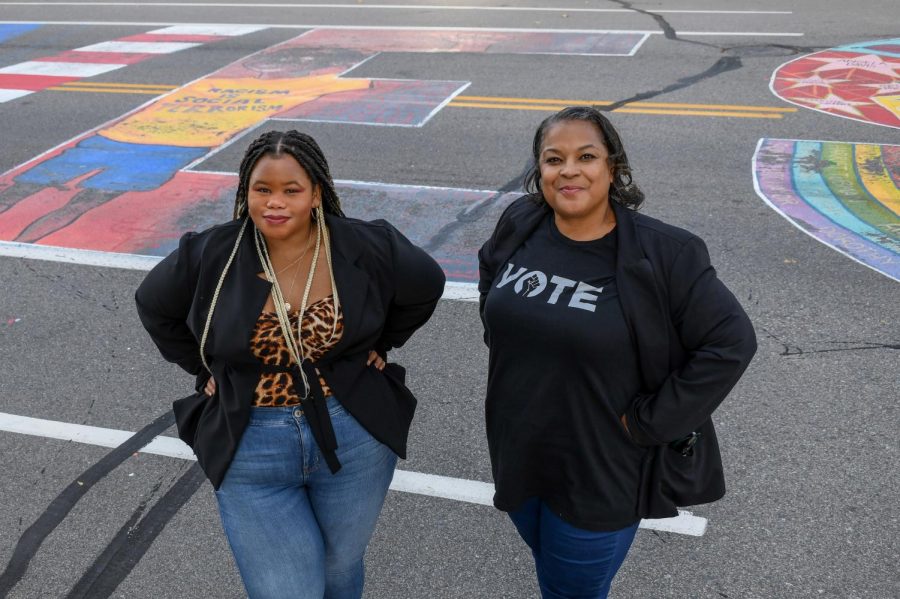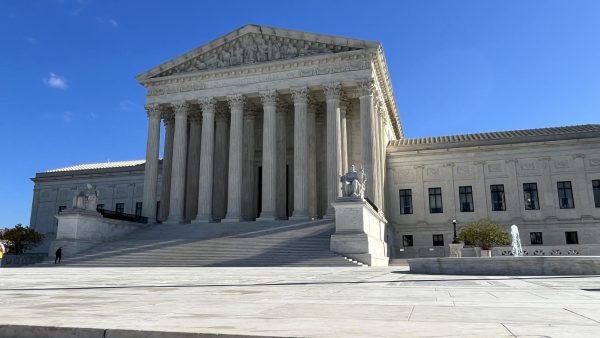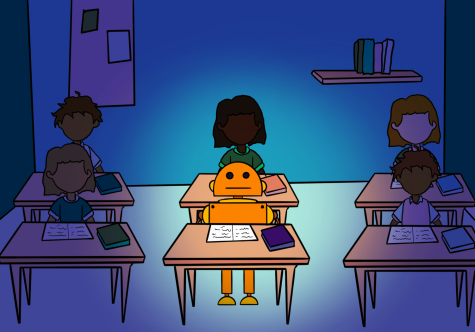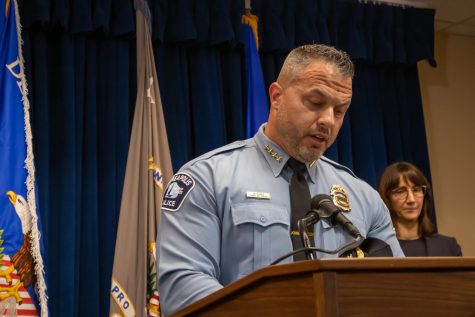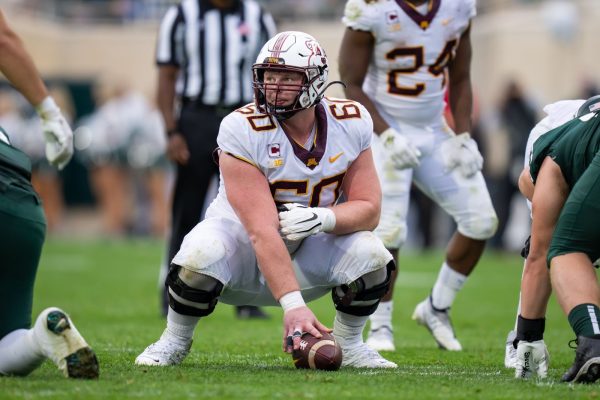UROC: One decade as a community institution
With roots in North Minneapolis, the University’s research and outreach center is meeting its ten-year anniversary with a vision for the future and a portfolio of ongoing work addressing systemic racism.
Image by Emily Urfer
From left, Student Shaunassey Johnson and UROC Executive Director Makeda Zulu-Gillespie pose for a portrait outside of the UROC building on Tuesday, Sep. 22.
The University of Minnesota’s UROC has spent a decade bridging the gap between the campus and North Minneapolis from its office within the community.
In its ten years, the University’s Robert J. Jones Urban Research and Outreach-Engagement Center (UROC) has been a space for community members to collaborate and conduct research across landscapes ranging from youth outreach to trauma recovery. This fall, UROC published a new research agenda to set a vision for the team to help support the North Minneapolis community in the era of the coronavirus pandemic and social unrest.
The research agenda is centered around addressing the three core themes of UROC: community healing, equity and financial well-being, as part of tackling issues of systemic racism.
In 2019, UROC’s research team, led by the community and supported by local officials, identified topics to guide the focus of its efforts throughout the coming years. UROC is now taking proposals from University faculty.
Makeda Zulu-Gillespie, a longtime resident of North Minneapolis who was named executive director of UROC last fall, said the demand to address issues of racism came as no surprise. She said these issues have been built into the system for decades.
“Of course, we have individual actors, but the individual actors don’t have as much power if there aren’t systems that support the behaviors or the actions,” Zulu-Gillespie said.
Redrawing the lines
Housing laws have cornered Black residents into North Minneapolis, and Zulu-Gillespie said these community members have faced prejudice for decades.
She finds that people within her community, specifically people of color, feel powerless from this cycle of self-defeat and systemic oppression. Zulu-Gillespie said many of the Northside residents she talks to feel ignored by local policy makers and politicians, especially on issues that directly impact their day to day.
Being overlooked and unheard in turn affects community members’ confidence, which can make them feel powerless to join in on new discussions or advocacy work. One of her goals with UROC is to break that cycle.
“You have this circle of people not turning out to vote because they think their vote doesn’t matter when it really does … it’s something that is deeply entrenched,” Zulu-Gillespie said. “You need the documentation [and research] to actually change the system.”
Following the police killing of George Floyd and ongoing violence in Minneapolis, UROC has specifically focused on responding to community trauma. The work has revolved around traumas caused by gun violence, drug use, mass imprisonment, mental health issues, domestic violence and more.
Shaunassey Johnson, a third-year anthropology student at the University and North Minneapolis resident, worked as a youth researcher and facilitator within UROC this past summer through its youth-focused group, YoUthROC. The group aims to act as a voice for young people during stakeholder meetings and address important issues that North Minneapolis youth face. Eight other members of color, ages 16-24 and from the University and Northside, comprise the team.
Following the protests and riots this summer, YoUthROC hosted a Northside cleanup where the team and a group of volunteers sought to restore the area and “foster community healing,” Johnson said. The group also participated in donating to food shelves in the area and participated in sit-ins and protests to fight police brutality.
Amplifying expression
George Roberts, another Northside resident and former teacher, is on UROC’s stakeholder’s committee. He is one of many who helps connect the office to the community.
Years ago, Roberts said he saw that a rundown convenience store on Plymouth Avenue North had become a place where adults sold cigarettes and liquor to children. He knew he had to do something.
Roberts and his wife purchased the building and opened up Homewood Studios, a community art center and gallery. The space is home to art workshops and exhibitions of local creators to help support their passions.
“We wanted to create something in thanks to this community for letting us raise our children here,” Roberts said.
Homewood Studios hosted a UROC-sponsored exhibit, “Art is My Weapon,” centered around sparking a conversation about gun violence in urban communities. The pieces were made from retired guns from a gun buyback program from the Minneapolis Police Department.
After seeing the positive impact that holding a space for artists had on his community, he asked for UROC’s help for another proposal. The old Lincoln Community School’s playground was in shambles, and Roberts has been working with UROC to try to rehabilitate the park for kids and neighbors. They are still working to bring that vision to reality.
“UROC has been important in fostering that vision and using the power of University research to give us the tools,” Roberts said.
Resilience
Last week, UROC faculty members and volunteers finished up a day of service projects by dancing in the parking lot of the UROC building and enjoying the warm weather together.
Brett Buckner, managing director of One Minnesota, a racially diverse coalition geared toward policy engagement, described the scene as “surreal” as COVID-19 and social unrest has made it difficult to maintain some type of normalcy.
Buckner, who graduated from Minneapolis’ North High School, partnered with UROC and other local organizations to start up Seeds to Harvest Service Coalition, a community-based service group.
Seeds to Harvest coordinated events that happened throughout July of this summer, including neighborhood cleanups, food and mask distribution, gardening projects, voter registration and census outreach.
Through recent challenges, Buckner said a group like UROC is invaluable to “let people know that it’s going to be okay and that we’re going to make it through it.”
The Lincoln School playground project and Seeds to Harvest are just a few of many community initiatives that UROC will continue to work on in the coming years.
Buckner said Zulu-Gillespie’s approach to her new position leading UROC is turning the office into a community-driven center for success rather than just an institution.
Zulu-Gillespie hopes the team will help create a “thriving urban core” in its future, which she defines as a place where people feel supported and valued as individuals while striving for further education.
She added that everybody is a part of undoing systemic racism, and her work as the head of this community-based research team is a key part of that undoing. She said while she values protesting, she takes a different approach to creating change.
“My way will be working with the research and residents and community organizations to impact the institutions in that way, and that’s also valuable,” Zulu-Gillespie said.


